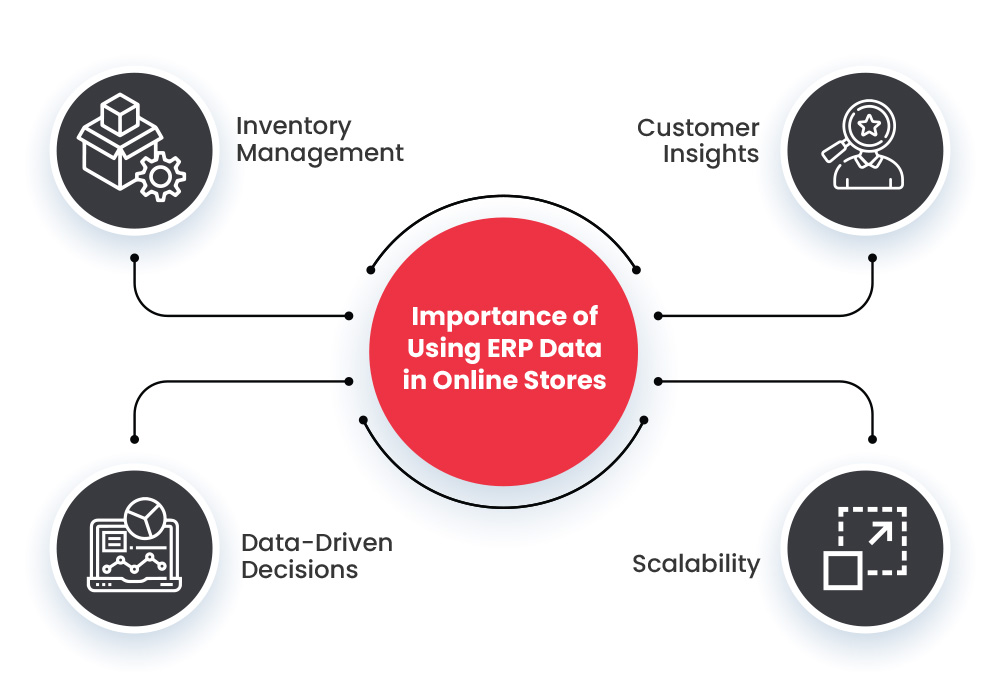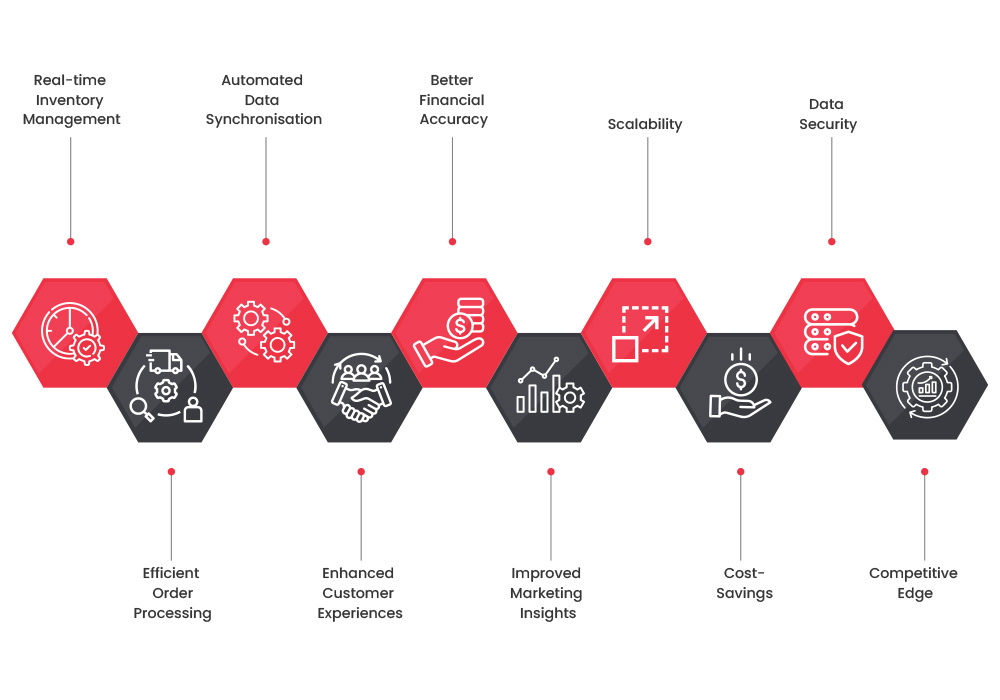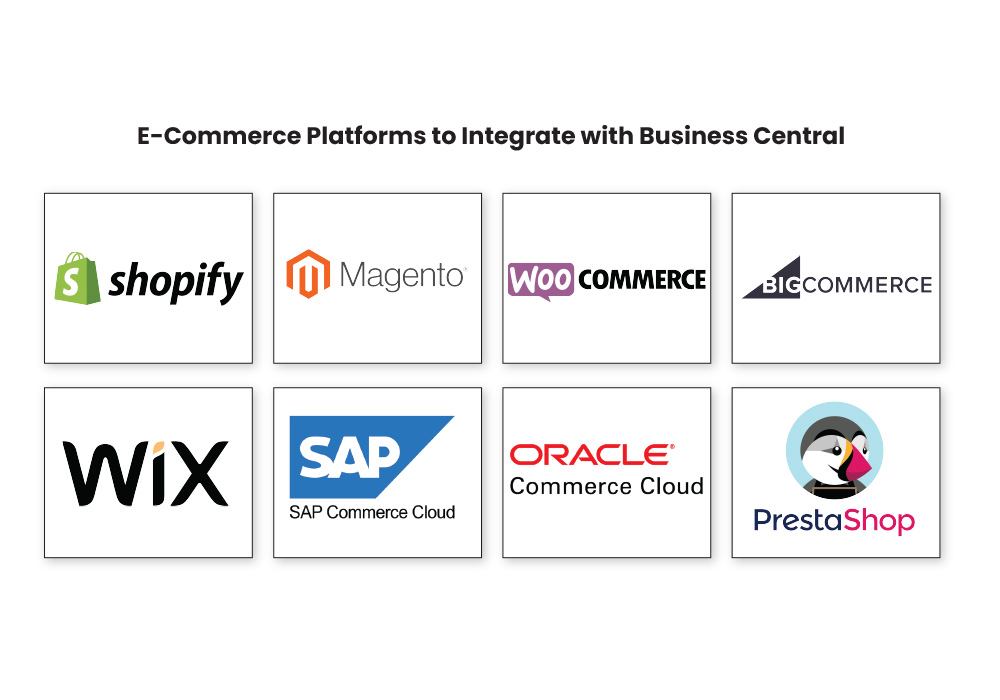Table of Content
Are you grappling with the challenges of integrating your enterprise resource planning (ERP) data into your online store? How can an e-commerce business effectively utilize an ERP system to overcome the hurdles of managing inventory, enhancing customer experiences, and driving sales in the competitive e-commerce landscape?
In our blog, “Business Central e-commerce: Use your ERP data to power your online store," we tackle these pressing questions and challenges head-on. We understand that the seamless synergy between ERP data and e-commerce is essential for thriving in today's digital marketplace.
Join us on a journey where we explore the strategies, solutions, and best practices that can help you harness the full potential of your ERP data. Learn how to turn it into a powerful catalyst for your online store’s success. From optimizing operations to unlocking valuable insights, our blog will provide you with the guidance and knowledge you need to elevate your e-commerce business to new heights.
Let’s get started!
Importance of Using ERP Data in Online Stores

In the fast-paced world of e-commerce, staying ahead of the competition requires more than just a user-friendly website and a compelling product catalog. It demands data-driven insights and strategic decision-making. This is where Enterprise Resource Planning (ERP) data steps in as a game-changer for online stores.
Inventory Management
One of the most critical aspects of running a successful online store is managing inventory efficiently. ERP systems provide real-time updates on stock levels, helping businesses avoid overstocking or understocking issues. This not only optimizes storage costs but also ensures customers get what they want when they want it.
Customer Insights
Understanding your customers' behavior is key to tailoring your offerings and marketing efforts. ERP data can provide valuable customer insights, such as purchase history, preferences, and trends, allowing you to create personalized shopping experiences and targeted marketing campaigns.
Data-Driven Decisions
In a data-driven world, ERP data equips you with the information needed to make informed decisions. It aids in identifying profitable products, forecasting demand, and adapting to market changes swiftly.
Scalability
As your online store grows, so does the complexity of managing operations. ERP systems are designed to scale with your business, ensuring that you can continue to handle increasing volumes without compromising efficiency.
What is Microsoft Business Central E-commerce Integration?
Microsoft Business Central E-commerce integration refers to the seamless connection between Microsoft Dynamics 365 Business Central, a comprehensive ERP system, and an e-commerce platform. This integration empowers businesses to efficiently manage their online sales and back-end operations in a unified manner.
For example:
Consider a retail company that uses Business Central to handle inventory, orders, and financials. By integrating it with their e-commerce website, they can automatically update inventory levels, synchronize order information, and ensure real-time financial data accuracy.
This not only reduces manual data entry but also enhances customer experiences by providing up-to-date product availability and order tracking, resulting in a more streamlined and competitive e-commerce operation.
Top 10 Benefits of Microsoft Business Central E-commerce Integration

Real-Time Inventory Management
Integration allows for instant updates on product availability, reducing the risk of overselling and ensuring customers receive accurate information.
Efficient Order Processing
Streamlined order management means quicker order processing, reduced errors, and improved customer satisfaction.
Automated Data Synchronisation
Data, such as product details and pricing, is automatically synchronized between your ERP system and e-commerce platform, eliminating manual data entry.
Enhanced Customer Experiences
Customers can access up-to-date information on product availability, order status, and more, leading to improved satisfaction and loyalty.
Better Financial Accuracy
Integrated systems ensure that financial data, including sales and revenue, is accurate and consistent across the board.
Improved Marketing Insights
Access to ERP data helps you analyze customer behavior, purchase history, and trends, enabling targeted marketing efforts.
Scalability
As your business grows, the integration can easily scale to handle increased transactions and data volumes.
Cost-Savings
Reduced manual data entry and improved operational efficiency lead to cost savings over time.
Data Security
Integration often comes with robust security features, safeguarding sensitive customer and financial data.
Competitive Edge
With faster operations, better customer experiences, and data-driven decision-making, integration gives you a competitive advantage in the e-commerce marketplace.
Related Posts - How Dynamics 365 ERP and CRM Integration Can Power Your Sales
Top E-Commerce Platforms to Integrate with Business Central

Integrating Microsoft Dynamics 365 Business Central with the right e-commerce platform is crucial for a seamless and efficient operation. Here are some top e-commerce platforms that are well-suited for integration with Business Central.
Dynamic Web
Dynamics Web emerges as the leading e-commerce platform for Business Central integration. This integration streamlines operations, fosters data coherence, and fuels efficient business growth.
Shopify
Shopify is a popular and user-friendly e-commerce platform that offers a range of Shopify integration to Business Central to manage inventory, orders, and customer data efficiently.
Magento
Magento is a robust and highly customizable e-commerce platform that can be integrated with Business Central to synchronize product details, inventory, and orders.
WooCommerce
If you use WordPress for your e-commerce site, WooCommerce is a powerful plugin that can be integrated with Business Central for seamless data Synchronisation.
BigCommerce
BigCommerce offers a cloud-based e-commerce platform with features for integrating with ERP systems like Business Central to manage inventory, orders, and customer data.
Wix
Wix is a user-friendly website builder that can be integrated with Business Central through various plugins and extensions for e-commerce functionality.
SAP Commerce Cloud
For larger enterprises, SAP Commerce Cloud provides a comprehensive e-commerce solution that can be seamlessly integrated with Business Central for efficient data management.
Oracle Commerce Cloud
For larger enterprises using Oracle ERP systems, Oracle Commerce Cloud can be integrated with Business Central to ensure data consistency and efficiency.
PrestaShop
PrestaShop is an open-source e-commerce solution that can be integrated with Business Central to streamline your online store operations.
The choice of the best e-commerce platform for your integration with Business Central depends on your business needs, budget, and technical requirements. It’s essential to assess your specific requirements and choose a platform that aligns with your goals and provides the necessary features for a successful integration.
Related Posts - Platforms to Integrate with Microsoft Dynamics 365
Conclusion
In conclusion, harnessing the power of ERP data through Business Central integration is a strategic move for any e-commerce business. This symbiotic relationship between your ERP system and your online store can revolutionize operations. Real-time data Synchronisation ensures that your inventory is accurate, pricing is competitive, and customer experiences are personalized.
Better financial insights enable smarter decision-making, and efficient order processing enhances customer satisfaction. While the setup may require some initial effort, the long-term benefits in terms of improved efficiency, reduced costs, and increased profitability make it a worthwhile investment.
In the fast-paced world of e-commerce, using your ERP data to its fullest potential can give you a competitive edge and set your online store on a path to sustainable growth.
FAQ's - Business Central Ecommerce
1. What is Business Central, and how does it relate to e-commerce?
Business Central is an ERP (Enterprise Resource Planning) system that helps manage various business operations. It can be integrated with e-commerce platforms to streamline processes and use ERP data for online store management.
2. Why should I integrate Business Central with my e-commerce platform?
Integrating Business Central with your e-commerce platform ensures real-time data Synchronisation, improves inventory management, enhances customer experience, and provides accurate financial insights for better decision-making.
3. How can ERP data enhance the customer experience in e-commerce?
ERP data can provide valuable insights into customer behavior, purchase history, and preferences. This information enables personalized marketing, product recommendations, and a seamless shopping experience.
4. Is it complicated to set up Business Central integration with an e-commerce platform?
The complexity of integration depends on your specific systems and requirements. However, with the right expertise and tools, integration can be relatively straightforward, and many e-commerce platforms offer integration options.
5. Can Business Central help with multi-channel selling and inventory management?
Yes, Business Central can support multi-channel selling by providing a centralized view of inventory across all channels. This ensures that stock levels are accurate and prevents overselling.
6. Are there any security concerns with integrating ERP data into e-commerce?
Security is a crucial consideration when integrating systems. Ensure that proper data encryption, access controls, and authentication measures are in place to protect sensitive information.
7. What return on investment (ROI) can a business expect from integrating Business Central with its E-commerce operations?
The ROI can vary depending on factors like your business size, current processes, and the quality of integration. However, businesses typically see improved operational efficiency, reduced costs, and increased revenue because of this integration.

Witness a scalable transformation
Experience real-time synchronisation and flexibility with a consistent view across your business.
Disclaimer– “All data and information provided on this blog is for informational purposes only. Dynamics Square / MPG Business Information Systems Pvt. Ltd. makes no representations as to accuracy, completeness, currentness, suitability, or validity of any information on this site and will not be liable for any errors, omissions, or delays in this information or any losses, injuries, or damages arising from its display or use.”













